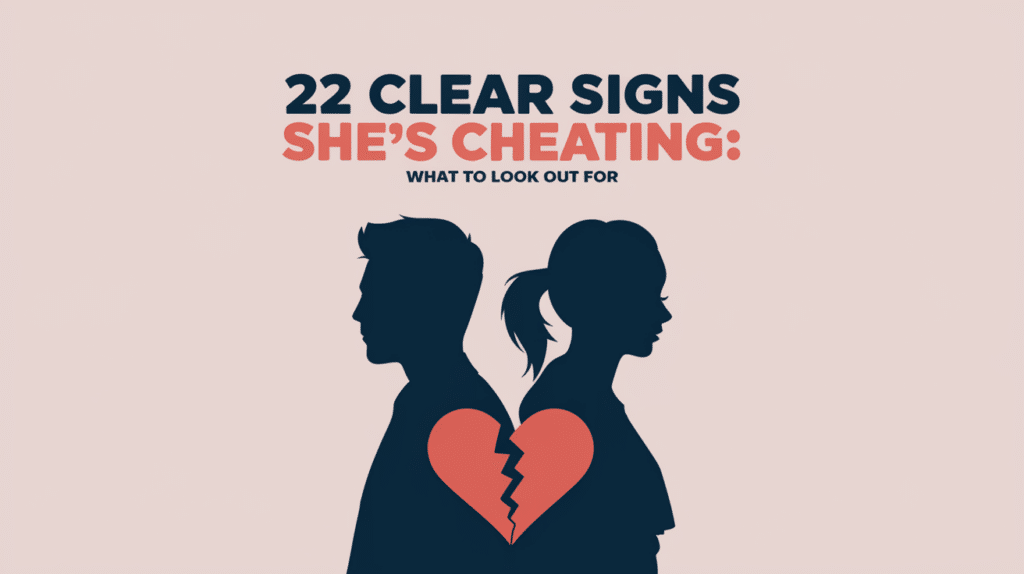“Is she acting differently lately?”
It hurts when trust feels broken. Small changes in behavior might make you question your relationship – late nights at work, guarded phone habits, or sudden distance.
These signs can leave you confused and worried.
But here’s the truth: understanding these warning signs can help you know what’s real and what’s not.
We’ve put together 22 clear signs based on relationship experts’ insights.
This list isn’t meant to make you paranoid – it’s here to help you spot genuine red flags and make informed choices about your relationship.
Trust and Relationships: The Foundation of Love

Trust and love go hand in hand. They form the base of every lasting relationship, just like roots support a tree.
When two people trust each other, they share their hopes, fears, and daily life without holding back.
Building trust takes time. It grows with each kept promise, each honest talk, and each moment of being there for each other.
Small acts matter – sending a text when you’re running late, keeping private conversations private, or simply doing what you said you would do.
In healthy relationships, partners feel safe. They know they can count on each other through good times and bad.
They share passwords not because they have to but because they want to. They talk about their worries instead of bottling them up.
But trust isn’t just given – it’s earned day by day. Like a bridge between two people, it lets love flow freely and strengthens the relationship.
Why Do People Cheat?
People cheat for many reasons, though none justify breaking someone’s trust. Understanding these reasons can help spot warning signs early in relationships.
Common reasons behind cheating include:
- Feeling alone in the relationship – when partners stop talking or spending time together, some look outside for attention
- Missing excitement – some seek the thrill of something new when relationships become routine
- Poor choices during hard times – stress at work or personal problems can lead to bad decisions
- Self-esteem issues – some look for approval from others when they feel unsure about themselves
- Communication gaps – when couples don’t talk about their needs or problems openly
The key thing to remember? These reasons explain but don’t excuse cheating. Open talks, counseling, or ending the relationship are better choices than being unfaithful.
Red Flags in Relationships: Signs She’s Cheating

1. Changes in Phone Habits
Her phone becomes a fortress of privacy, always kept close and guarded.
You might notice she turns it face-down when you’re near or takes it everywhere, even for quick bathroom breaks.
Text messages and calls are answered in other rooms, and there’s a new pattern of silencing notifications when you’re together.
Her phone might have a new password, or she changes it frequently without explaining why.
2. Work Schedule Shifts
The once-reliable work routine becomes unpredictable and filled with late nights.
She mentions new projects or meetings, but details remain fuzzy when you ask about them. Work calls that never happened before now come at odd hours, and she steps away to take them.
When you try to discuss these changes, she becomes defensive or changes the subject quickly.
3. New Password Protection
Once-shared accounts become private territories.
Email passwords change without notice, and social media accounts have new security settings.
When you mention needing access to shared information, she provides excuses rather than passwords.
This new digital wall extends to devices that were previously open between you.
4. Extra Attention to Appearance
A sudden surge in self-care that goes beyond normal personal maintenance appears. She buys new clothes, changes her hairstyle, or starts a new fitness routine without sharing her motivation.
Shopping trips for personal items have become more frequent, and she’s less likely to ask for your opinion on new purchases.
The timing of these changes, especially before work or social events you don’t attend, stands out.
5. Less Emotional Connection
Your deep talks turn into surface-level chats. She stops sharing daily details that once flowed naturally between you.
When you try to dig deeper into her thoughts or feelings, she gives short answers or seems distracted.
The warm emotional space you once shared feels cool and distant. Even happy news gets a muted response
6. Lack of Interest in Physical Intimacy
Simple acts of affection like holding hands or quick kisses stop feeling natural.
She might move away from hugs or find reasons to avoid physical closeness.
When intimacy does happen, it feels mechanical or rushed. Small gestures like sitting close on the couch or goodbye kisses become rare.
The warmth and spontaneity in physical touch fades.
7. Money Patterns Change
Bills show unusual spending at places she’s never mentioned.
Cash withdrawals happen more often, with vague explanations about where the money goes. Credit card statements might arrive separately now, or online banking passwords may change.
She might start hiding receipts or become defensive when discussing expenses. Small purchases that never needed explaining before now come with long stories.
8. Social Circle Changes
New names pop up in conversations, but details about these people stay vague.
When you ask about meeting these new friends, she finds reasons why it’s not possible.
Old mutual friends start acting differently around you – they might seem uncomfortable or avoid certain topics. Some friends might stop coming around as often, especially those who’ve known you both for years.
9. Weekend Plans Shift
Regular weekend routines start breaking without clear reasons. Saturday errands take much longer than usual.
She makes solo plans more often, sometimes with last-minute notice. When you suggest weekend activities together, she usually has other commitments.
The comfortable pattern you once shared becomes unpredictable.
10. Communication Gaps
Messages that once got quick replies now sit unanswered for hours. She explains being “busy” more than before, even during times when she used to be available.
Phone calls go to voicemail during parts of the day that were never off-limits before.
When you do talk, conversations feel rushed or distracted.
11. Less Future Talk
Conversations about next month’s plans or next year’s goals become rare.
She changes the subject when you bring up future events or commitments.
Talk of shared dreams – like vacation plans or home improvements – gets met with vague responses. When you try to nail down specific future dates, she keeps things open-ended.
The shared vision of tomorrow that once excited her now seems to make her uncomfortable.
12. Different Social Media Behavior
Her online presence changes noticeably. Posts that once included “we” become more about “I.”
She might untag herself from your shared photos or post at times when she’s supposedly busy.
Her friend list grows with people you’ve never heard of. Comments and likes come from new names, while interactions with you decrease.
She might even create new accounts you didn’t know about.
13. Emotional Distance
Daily moments feel less connected. She seems physically present but mentally elsewhere during conversations.
Sharing good news or bad doesn’t get the emotional response it used to.
Her laugh sounds forced, and her smiles don’t reach her eyes. The natural flow of sharing feelings and thoughts becomes stilted and artificial.
14. Changed Friend Behavior
Mutual friends start acting strange around you.
They might avoid eye contact or seem uncomfortable when you mention her name. Some friends might slip up and mention events you weren’t told about.
Others might suddenly stop including you in group plans. The usual warmth from shared friendships feels replaced with awkward interactions.
15. Unexplained Absences
Quick trips to the store stretch into hours without explanation. She has more “appointments” but keeps details fuzzy.
When you ask about her day, times and places don’t quite add up. Simple errands that once took predictable time now have variable durations.
She might say she’s in one place, but her true location is elsewhere.
16. Different Energy Levels
Regular activities with you get the “too tired” response, but she has plenty of energy for other plans.
She might skip family dinners, claiming exhaustion, but then get dressed up to meet friends.
Weekend mornings that were once for shared coffee become solo gym time. Her energy seems selective – high for some activities, mysteriously low for others.
17. Memory Inconsistencies
Stories about where she’s been changed slightly with each telling.
Details shift when you ask follow-up questions about her day. Names of people she was with might change, or times don’t match previous versions.
When you point out these differences, she gets defensive or claims you misunderstood.
Simple questions about her day lead to complicated, changing answers.
18. New Private Habits
Phone calls move to other rooms or the garage.
Her laptop screen quickly changes when you walk by. She starts using headphones for messages or turns her phone away while typing.
Private conversations that once happened naturally in shared spaces now occur behind closed doors.
19. Less Share Time
Family events suddenly become “too crowded” for both of you to attend.
Friend gatherings that were once shared become solo outings.
She suggests you skip social events that were once important to both of you. When you do attend together, she spends more time on her phone than engaging with you or others.
20. Changed Sleep Patterns
Late-night phone checks become frequent.
She stays up after you go to bed, claiming she’s “not tired.” Bathroom visits at odd hours last longer than usual, often with her phone.
She might wake up extra early to check messages or make calls.
Weekend sleep-ins become solo time with her phone rather than shared lazy mornings.
21. Gift Guilt
Random presents appear without special occasions.
She buys things she knows you like but at odd times. These gifts often come after unexplained absences or changed plans.
The presents might feel like making up for something, rather than genuine giving.
When you ask about the timing, she says, “Just because,” but it seems uncomfortable.
22. Different Car Behavior
The car’s mileage shows more distance than her explained trips account for.
She makes excuses to drive separately to shared destinations.
The passenger seat settings change position when you haven’t moved them. Gas receipts show fill-ups in areas she hadn’t mentioned visiting.
She might start cleaning the car more often or become protective of who drives it.
Remember: Finding one or two of these signs doesn’t automatically mean cheating. These patterns matter more when several appear together or when they mark clear changes from normal behavior. How Can I Approach the Topic of Cheating with My Partner?
What to Do When Trust Breaks: Your Next Steps
1. First 24 Hours: Take Care of Yourself
- Step back and breathe
- Write down your thoughts and feelings
- Avoid making big decisions while emotional
- Don’t post on social media
- Talk to a trusted friend or family member
2. Before You Confront Her, Gather your thoughts
- Plan what you want to say
- Choose a private, neutral place
- Set aside enough time
- Stay calm and focused
3. During The Talk
- State what you know, not what you suspect
- Listen without interrupting
- Keep your voice steady and calm
- Ask clear questions
- Take breaks if emotions run high
4. Important Don’ts:
- Don’t contact the other person
- Don’t tell everyone you know
- Don’t try to get even
- Don’t make promises you can’t keep
5. Moving Forward Options:
- Work on rebuilding (if both want to):
- Set clear expectations
- Start couples counseling
- Build new trust slowly
- Create new boundaries
6. If you choose to end things:
- Make a clean break
- Handle shared responsibilities
- Take care of legal matters
- Build your support system
The Bottom Line
Spotting these warning signs doesn’t mean your relationship is over.
Sometimes, what looks like cheating might be a cry for help or a sign of other problems that need attention.
Your feelings matter. If something feels wrong, it’s okay to speak up. A healthy relationship grows stronger through honest talks, even when those talks are hard.
You can choose what’s best for you – whether that means working things out or walking away. Both choices take courage.
The most important thing? Take care of yourself first. Talk to friends, family, or a counselor.
They can help you see things clearly and support you as you decide your next steps. You deserve a relationship built on trust and respect. Remember that as you move forward.


















